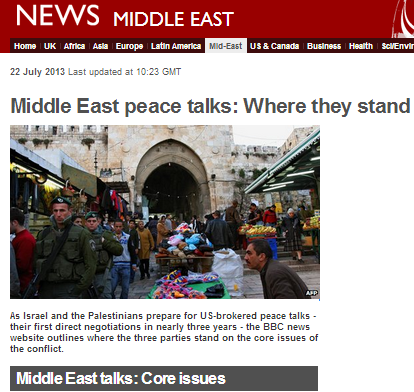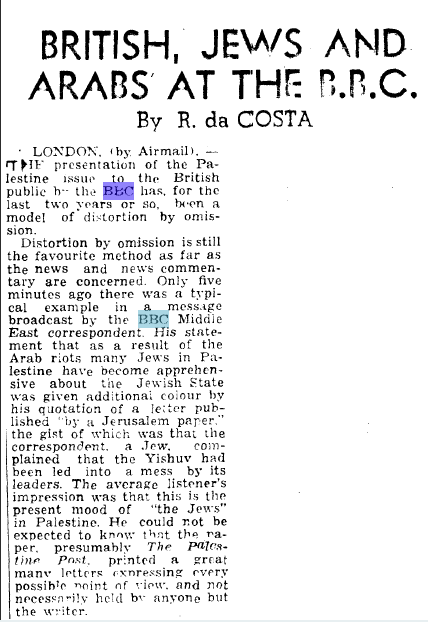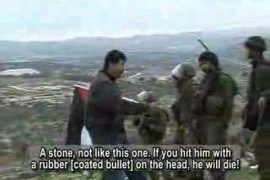As documented in part one of this post, the afternoon edition of the BBC World Service radio programme ‘Newshour‘ on February 10th presented listeners with a lavish dose of Syrian and Iranian propaganda relating to the story that began when an Iranian UAV infiltrated Israeli airspace earlier on the same day, with presenter Julian Marshall steering listeners towards the view that the story should be seen in terms of ‘narratives’.
The evening edition of the same programme – again presented by Marshall – also led with the same story. The programme’s web page is titled “Israel Defends Attack on Iranian Targets” and the synopsis once again fails to mention the trigger for the day’s events.
“An Israeli army spokesman says airstrikes against targets in Syria were vital to protect national security.”
Opening the programme, Marshall told listeners:
Marshall: “Israeli war planes carry out a series of strikes in Syria during a day of cross-border tension – that is our top story today.”
Marshall’s introduction to the item (from 00:83) once again failed to clarify to audiences that previous Israeli strikes on military targets in Syria have nothing to do with the Syrian civil war and cast doubts on the veracity of official Israeli statements on the incident. [emphasis in italics in the original, emphasis in bold added]
Marshall: “But we begin with that wave of attacks on Syria by Israeli war planes. It’s certainly not the first time that Israel has launched air raids on Syria in the course of the current conflict but the latest are being described as the most significant attacks of their kind since the 1982 Lebanon war by a senior Israeli Air Force general. It all began with the incursion into Israeli territory of what Israel says was an Iranian drone. Israel dispatched planes in response to attack the drone launch site in Syria and one of the planes was hit by a Syrian anti-aircraft missile and crashed in northern Israel. And then came the big raid: Israeli war planes attacking a dozen targets in Syria including air defence systems and sites linked to Iran. The prime minister Benjamin Netanyahu says his country will not allow Iran to establish a military presence in Syria.”
After listeners had heard a recording of part of the Israeli prime minister’s statement, Marshall went on:
Marshall: “And I asked the spokesman for the Israeli Defence Force, Jonathan Conricus, to tell me more about the targets in Syria.”
Conricus: “This was indeed a large-scale attack – probably the largest that we’ve made over the last thirty or so years. We specifically targeted 12 different targets. Eight of them were Syrian military targets located in the surroundings of Damascus and related to the air defence array – the same ones that fired missiles towards Israeli aircraft. And the four additional targets are perhaps the most special ones because they were Iranian targets inside Syria. All of them part of the effort that Iran has been undertaking for quite some time and that we have been warning against over a long period of time. The four targets belonged to the Iranian military or the Revolutionary Guard – training facility, support facilities and the likes. That was really I think the most important part of the attack that we did was that for the first time we have actually attacked Iranian targets on Syrian soil.”
Marshall: “And attacking Iranian targets on Syrian soil was very much in retaliation for the overflight of what you say was an Iranian drone onto Israeli territory.”
After Lt-Col Conricus explained that the sequence of events began with the penetration of the Iranian UAV into Israeli airspace and that Israel “know[s] for sure that this specific UAV was dispatched by Iranian military and it was handled by Iranian military while it was violating Israeli airspace”, Marshall came up with a claim for which he provided no evidence whatsoever.
Marshall: “With all due respect sir, this was a surveillance drone – was it not? – rather than an armed drone. Did it really pose any threat to the Israeli state?”
Conricus: “We’ll be able to elaborate on that in the coming days. As of now I’m not at liberty to say exactly what that drone was doing but I can assure you that it was not a peaceful mission monitoring the weather or following migrating birds. This was a military UAV that had a specific military mission to penetrate into Israel and to perform a military task.”
After Lt-Col Conricus had spoken about the interception of the drone and the subsequent attack on its command module in Syria, Marshall resurrected an old BBC favourite: the ‘disproportionate’ allegation.
Marshall: “I mean some might think it a somewhat disproportionate response to the flying of a drone over your territory that you mounted such a massive raid on Syrian territory.”
After his interviewee replied, Marshall went on:
Marshall: “But I mean Israel has known for a long time – as have other nations – about an Iranian military presence in Syria. Why choose now to attack? I mean was it simply that drone coming into your airspace? Is that what the trigger was?”
After the IDF Spokesman replied – explaining that Israel had responded “to an act of aggression against us…by striking only military targets in a proportionate manner” – Marshall closed that interview (part of which was later promoted separately on social media) before going on to amplify more propaganda from the Iranian regime and its proxy:
Marshall: “Well Iran has accused Israel of lying about the drone – which it said had not entered Israeli territory – while Hizballah has said the downing of an Israeli plane by Syrian missiles marks the start of a new strategic era.”
Listeners then once again heard the entire interview with the Syrian regime TV journalist Alaa Ebrahim that was aired in the earlier edition of ‘Newshour’ – including the unchallenged repetition of Syrian regime messaging and the claim that there was no such thing as an Iranian UAV at all and so “the Israeli attacks were unprovoked”.
Once again we see that BBC World Service audiences hoping to get clear, accurate information that would help them understand this story were instead sold short by a ‘report’ that presented the unchallenged propaganda of the Syrian and Iranian regimes on an equal footing with factual information from an Israeli official which Marshall found fit to repeatedly question.
Related Articles:
BBC WS Newshour coverage of Iran drone story –part one
BBC jumbles cause and effect, amplifies disinformation in Iran drone story – part one
BBC jumbles cause and effect, amplifies disinformation in Iran drone story – part two




